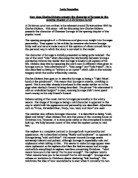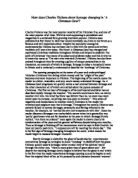Later in the first stave, we come across a description of Scrooge. He’s said to be “a tight-fisted hand at the grindstone. Scrooge! A squeezing, wrenching, grasping, scraping, clutching, covetous, old sinner! Hard and sharp as flint, from which no steel had ever struck out generous fire; secret, and self-contained, and solitary as an oyster.” This heavy use of negative adjectives helps the reader understand just how awful a person Scrooge is meant to be. The similes used also help exaggerate just how bad he is. “Hard and sharp as flint” can be interpreted as someone so hard to communicate with and get to know deeply, and the sharp is probably referring to how hurtful he can be.
Also, Scrooge is portrayed as an ugly person, with the use of pathetic fallacy to express this, “the cold within him froze his old features, nipped his pointed nose, shrivelled his cheek…” This effect helps create negative feelings towards his character as it’s using the fact he’s cold-hearted to further exaggerate his bad looks. By using this idea, Dickens creates feelings of antipathy towards Scrooge.
Another example of the use of pathetic fallacy to create feelings of antipathy towards Dickens’s character is “No warmth could warm, no wintry weather could chill him.” What I think Charles Dickens means here is that Scrooge is such a cold person and he won’t ever be anything less than cold. The second part of the second is to show that he’s so cold that the wintry weather could not make him any worse. This technique is used to further express just how unfeeling Scrooge can be.
The first words Dickens puts in Scrooge's mouth are his response to his nephew, Fred's, holiday greetings. "A merry Christmas, Uncle! God save you," says Fred; to which Scrooge replies, immortally, "Bah! . . . Humbug!" In two words, Scrooge establishes himself as the personification of cheerless, joyless, cold hearted inhumanity, an impression strengthened throughout the opening stave.
After this first stave where Dickens creates Scrooge as this almost inhumane, heartless character, we now see a huge turnaround after his visit by the three Christmas spirits. He is now a totally reformed person with love for the Christmas season. This change makes the novel very symmetrical in structure.
This change in personality is shown by many different techniques. “I am as light as a feather, I am as happy as an angel, I am as merry as a schoolboy. I am as giddy as a drunken man.” In the first stave where this repeated use of similes was used to describe just how bad a person Scrooge was, is now used to describe just how happy and excited he is at the time. This provides a big contrast to the Scrooge we’ve seen earlier in the novel and allows the reader to understand how much of a change he has gone through.
The use of holophrastic phrases helps express Scrooge’s goodwill and emotions at the end of the story. “Hallo! Whoop! Hallo here!” His exclamations and greetings show just how jovial and happy he is, due to him getting a chance to change his life.
We also see the use of onomatopoeia in this last stave, “Clash, clang, hammer; ding, dong, bell. Bell, dong, ding; hammer, clang, clash! Oh glorious, glorious!” The use of onomatopoeia here shows just how much of a bright and breezy atmosphere Scrooge is in. This again contrasts with the dark and dreary atmosphere we see in the first stave. This shows us that with one person’s happiness can rub off on the people around him and make the world a nicer place, which I believe is part of the purpose for Charles Dickens writing this novel.
The irony of the story is that we can see how much happier Scrooge is giving his money away rather than being a tight-fisted miser. This gives an ‘it’s better to give than to receive’ kind of message to the novel.
One of the fundamental facts about the story is that characters are interesting in proportion to the degree of change they undergo as a result of discovery. That belief is clearly revealed in ‘A Christmas Carol’ and it accounts for the continuing and undeniable interest that we feel in the transformation of Scrooge from an unfeeling monster into a morally reborn human being.
“He became as good a friend, as good a master, and as good a ma, as the good old city knew, or any other good old city, town, or borough, in the good old world.” This last quote sums up Dickens’s purpose for writing this novel of change. If this monster of a character can change, anyone can.








